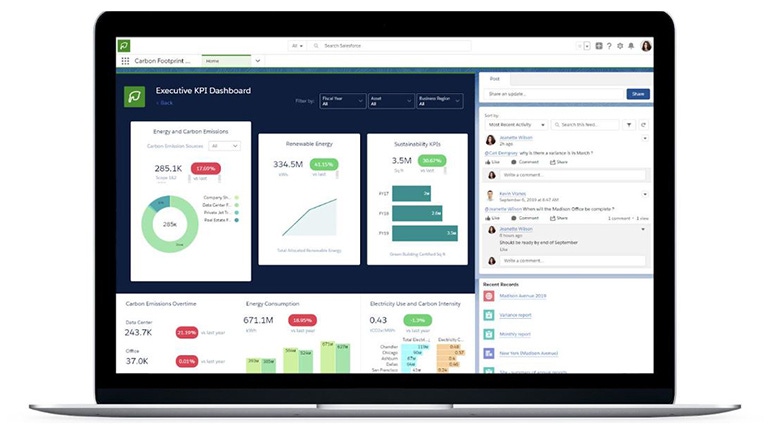Salesforce Creates Cloud-based Carbon Footprint Tracker
The company’s Sustainability Cloud gives businesses a 360-degree view of their environmental impact so they can analyze and report environmental data.

Following the United Nations’ (U.N.) lead regarding climate change and its Sustainable Development Goals (SDGs), a San Francisco-based customer relationship management company has launched a sustainability platform to help businesses track their carbon footprints.
Salesforce’s Sustainability Cloud is a carbon accounting product that gives businesses a 360-degree view of their environmental impact so they can analyze and report environmental data. Data measured with Sustainability Cloud provides insights that guide the process of setting sustainability goals.
“Sustainability Cloud tracks carbon emissions, renewable energy use and how a company is measuring against its sustainability goals,” says Ari Alexander, general manager of the Salesforce Sustainability Cloud. “Based on a system that Salesforce first used internally to track carbon emissions, Sustainability Cloud makes data easily accessible to sustainability managers and helps businesses view their carbon footprint.”
A company’s carbon data is surfaced in Salesforce Einstein Analytics, which analyzes user data to help them make informed business decisions—both for audit purposes and executive engagement.
“As a company whose core offering is inherently forest-friendly, we are helping our more than 535,000 customers save millions of trees every year and decrease their use of paper,” said Dan Springer, CEO of San Francisco-based DocuSign, in a statement. “This focus on sustainability is why we’re excited about Salesforce’s launch of Sustainability Cloud—it has great potential to help businesses tackle climate change more effectively by providing an easy solution for tracking, evaluating and ultimately reducing their impact on the environment.”
The platform’s goal is to drive climate action that will accelerate the world��’s efforts toward carbon neutrality.
“We care about the environment and are conscious of our ecological footprint, while striving to minimize it,” said Isabelle Leung-Tack, vice president of global communications at Paris-based Criteo, in a statement. “The opportunity to work with Salesforce has been a tremendous one. Sustainability Cloud allows us to gather our entire carbon footprint, look at the data and start making a change. Our vision is that by having access to the data around our efforts, we will be able to reduce our environmental impact by identifying potential risks and taking action sooner than ever before.”
Salesforce is committed to achieving 100 percent renewable energy by 2022 and advocates for policies that support a low-carbon economy, according to Alexander.
“At Salesforce, we believe that business is a powerful and trusted platform to drive positive social and environmental impact for all stakeholders,” he says. “As the effects of climate change worsen, we continue our commitment to protect the environment.”
In 2018, Salesforce partnered with Mission 2020 to establish the Step Up Declaration, an alliance committed to harnessing the power of Fourth Industrial Revolution technologies to help reduce emissions across all economic sectors. The company also has joined 87 other companies in a commitment to limit global temperature rise to 1.5 degrees Celsius and reach net-zero emissions by no later than 2050. The company is a member of the “Business Avengers” coalition, focusing on the role businesses play in hitting the targets of the U.N.’s 17 SDGs by 2030.
“We all have a role to play, based on our unique skills, resources and core competency—we have tapped into our innovation and technology to take climate action now,” says Alexander.
About the Author(s)
You May Also Like


